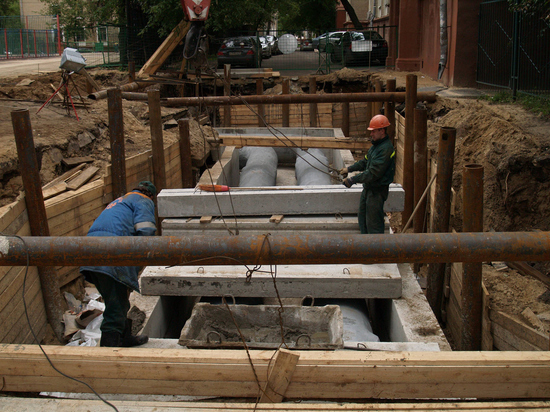The communal apartment is being modernized with money from the National Welfare Fund: experts explained the risks
[ad_1]

It seems that the National Wealth Fund in our country ceases to be a money-box of the state “for a rainy day.” Various options for the trillions accumulated there in various economic projects are being discussed more and more actively. Fortunately, there are many bottlenecks in the country. One of them is the modernization of engineering networks of housing and communal services. Which, especially in winter, often remind us of themselves with hot geysers from underground – but not with heat in residential buildings. The Federal Antimonopoly Service proposes to use the funds of the National Welfare Fund to upgrade the domestic communal apartment.
What is the essence of the idea of the antimonopolists? According to the complex application of the developer, resource supply companies can build engineering networks for technical connection to heat and water supply and sanitation. This will allow not to waste time on trifles and immediately create networks of large diameter, in the future for connecting all potential objects of housing and communal infrastructure.
Actually, the project of the Federal Antimonopoly Service is not new. At the beginning of last year, the government approved a program that provides for the provision of long-term loans from the National Welfare Fund to organizations for the renewal of heat and water disposal systems in the regions and the construction of treatment facilities. And there are even numbers. By order of Mikhail Mishustin, by the end of 2023, 150 billion rubles will be allocated from the National Welfare Fund for such work. Previously, this amount was supposed to be allocated until 2025.
It would seem that one can only rejoice that the billions lying “idle” in the “box” will be spent on a good and necessary cause for people. But not everything is so simple. Some financial analysts believe that access to the reserves of the NWF should be limited – especially in the context of the current budget deficit. As you know, in the first two months of the year, its deficit amounted to 2.6 trillion rubles, while for the entire year it was planned within 2.9 trillion.
And if you now put your hand into this “pod”, then very soon it will be left with legs and horns. And the financial “airbag”, after all, should remain, Russia has been behind it for more than one year, like behind a stone wall.
However, PhD in Economics, financial analyst Mikhail Belyaev says that the FNB was created not only to accumulate funds, but also to implement large-scale national projects. And our communal services are, of course, the most important problem for the entire economy.
– The budget deficit is a sentence for the economy, – he explains. – There are various measures to balance it. The main thing is that the country’s economy develops and moves forward. Dozens and hundreds of domestic companies producing equipment, including modern energy-saving equipment, should join the modernization of the housing and communal services sector. On this basis, the industry will receive an additional impetus in the production of pipes, taps, valves and other equipment. That will give the country an additional inflow of funds to the budget. But only if the funds from the National Welfare Fund are spent correctly and efficiently – which is what the antimonopoly services should monitor.
As Pavel Sklyachuk, the Popular Front expert on housing and communal services, explained to us, the FAS project concerns communal infrastructure at new facilities under construction. After all, despite any crises, life goes on and cities, under the program of integrated development of territories, grow with new residential microdistricts. Meanwhile, the coordination of the project with resource-supplying organizations costs approximately 30% of the total cost of the development project. Often there is simply nowhere to take this money from … And the second point is that the attraction of capital from the National Wealth Fund is supposed to be on a repayable basis. If a company uses the Fund’s funds for technological connection to water supply and sanitation networks during new construction, then after a certain period it is obliged to return these funds to the state.
– It will be much cheaper than a bank loan, but the loans are repayable, – emphasizes the expert. – This is done in order to reduce the cost of technological connection, accelerate the pace of construction and, accordingly, the cost per square meter for the end buyer.
And the program approved last year by the government to attract funds from the National Welfare Fund is aimed at already existing old worn-out networks, their gradual replacement. There are no return conditions, these are targeted subsidies for the modernization of the housing and communal services system.
By the way, according to Sklyanchuk, the average percentage of depreciation of existing utility networks is more than 40%. The most worn are the water supply and sanitation networks. Today they are renewed by about 3% per year of their total length. But in order for them to work smoothly and reliably, to ensure a stable supply of resources, they need to be replaced by about 5% per year. Unfortunately, networks age faster. The FAS initiative is designed to solve this problem.
However, in order for the authorities to make a final decision on this issue, it is necessary that at least the process of formation of the budget deficit slows down. So far, it is growing at an average rate of a trillion rubles a month, and for which infrastructure projects the reserves from the “pod” will not be directed: they are required to patch holes in the treasury.
[ad_2]
Source link






